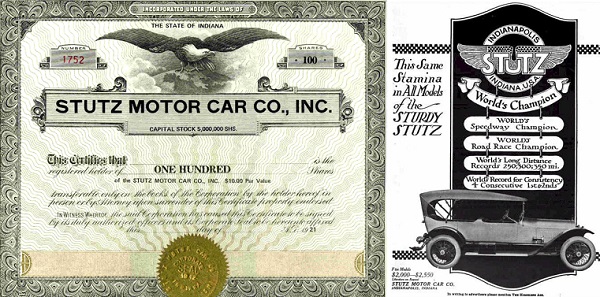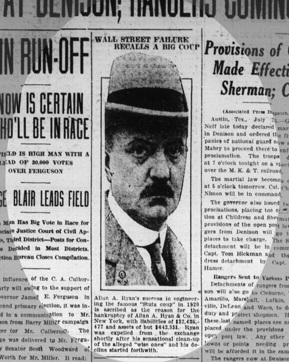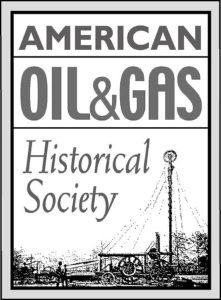
The Stutz Motor Car Company of Indianapolis, manufacturer of the famed “Stutz Bearcat” automobile, was briefly taken over by Allan Ryan, chairman of the Ryan Petroleum Corporation.
A 1920s Wall Street tycoon will lead Ryan Petroleum Corporation, hit a gusher in Texas, take over the Stutz Motor Car Company – and rip off his fellow tycoons.
When Ryan Petroleum Corporation was created in April 1919, its assets included 60 percent ownership of the Morton Petroleum Company whose president, A.D. Morton, became president of both companies.
Chairman of the Ryan Petroleum board of directors was a well-known Wall Street tycoon, Allan A. Ryan.
Ryan was the majority owner and on the boards of several companies, including Continental Candy, Republic Match, American Tobacco, and Stromberg Carburetor, among others. His tenure in the petroleum business would not be long.
The newly formed Ryan Petroleum leased about 41,000 acres in the Ranger, Texas, oil district as well as small leases near the Burkburnett oilfield close to the Red River border with Oklahoma.
The company brought in a 2,000-barrel-a-day gusher on the R.E. Waggoner ranch a few miles from Burkburnett. The wildcat well opened the “Northwest Extension” of the giant oilfield and launched yet another North Texas drilling boom.
By June 1919, there were more than 850 producing wells in “the world’s wonder oilfield.”
Discovered in 1918, the Burkburnett oilfield had joined earlier major discoveries in nearby Electra (1911) and Ranger (1917) that would make North Texas a worldwide leader in petroleum production. The drilling booms attracted the attention of Hollywood. See “Boom Town” Burkburnett.
But as contemporary reports noted, the North Texas oil booms had intensified competition for leases and equipment as growing oil production threatened to lower prices.
“The Ryan shares are a speculation, of course, and the company is so new that no earnings figures are available.” explained one observer. “The wild scramble for oil shares, which is a feature of the curb trading, should benefit Ryan still further, if nothing else.”
The company had drilling operations in Texas and Oklahoma and brought in several producers. Ryan Petroleum also had 40 wells in Kansas – but overproduction drove prices down as drilling costs went up.
In 1920, both Ryan Petroleum Corporation and Morton Petroleum stock certificates were replaced on the basis of a ten-for-one exchange with shares of Ryan Consolidated Petroleum, incorporated in Delaware.
The Magazine of Wall Street speculated about the company, noting, “Reasons Why a Well-Backed Oil Producer Has Not Made Good – Decline in Ryan’s Production – Was the Burkburnett Acreage Worth the Price Paid?”

When Allan Ryan declared personal bankruptcy in 1922, he was more than $32 million in debt.
Meanwhile, Ryan Petroleum Chairman Allan Ryan had become embroiled in an escalating Wall Street war with his business associates over a failed “short selling” stock scheme. He had fooled his fellow tycoons – presumably savvy New York Stock Exchange members – and cost them millions.
With lawsuits pending, Ryan was expelled from his seat on the Exchange.
His troubles, far from the Texas oil patch, involved a brief but scandalous “curb the market” takeover of the Stutz Motor Car Company that was subsequently adjudged, “conduct inconsistent with just and equitable principles of trade.”
One newspaper headline about the ousted broker noted, “Corner on Stutz Stock Leads to Downfall.”
The one-time Wall Street Wunderkind’s fortunes promptly deteriorated and he declared personal bankruptcy in 1922 with debts of more than $32 million. Charles Schwab was among investors who gained control of Stutz Motor Car the same year.
Ryan Consolidated Petroleum Corporation was sold by the Guaranty Trust Bank to a group of private investors (including A.D. Morton) and ultimately merged with Morton Petroleum Company in 1926. Company holdings were sold off by the Guaranty Trust Company of New York. Allan A. Ryan died October 13, 1981.
___________________________________________________________________________________
The stories of other attempts to join petroleum exploration booms (and avoid busts) can be found in an updated series of research at Is my Old Oil Stock worth Anything?
___________________________________________________________________________________
Please support the American Oil & Gas Historical Society and this website with a donation.


